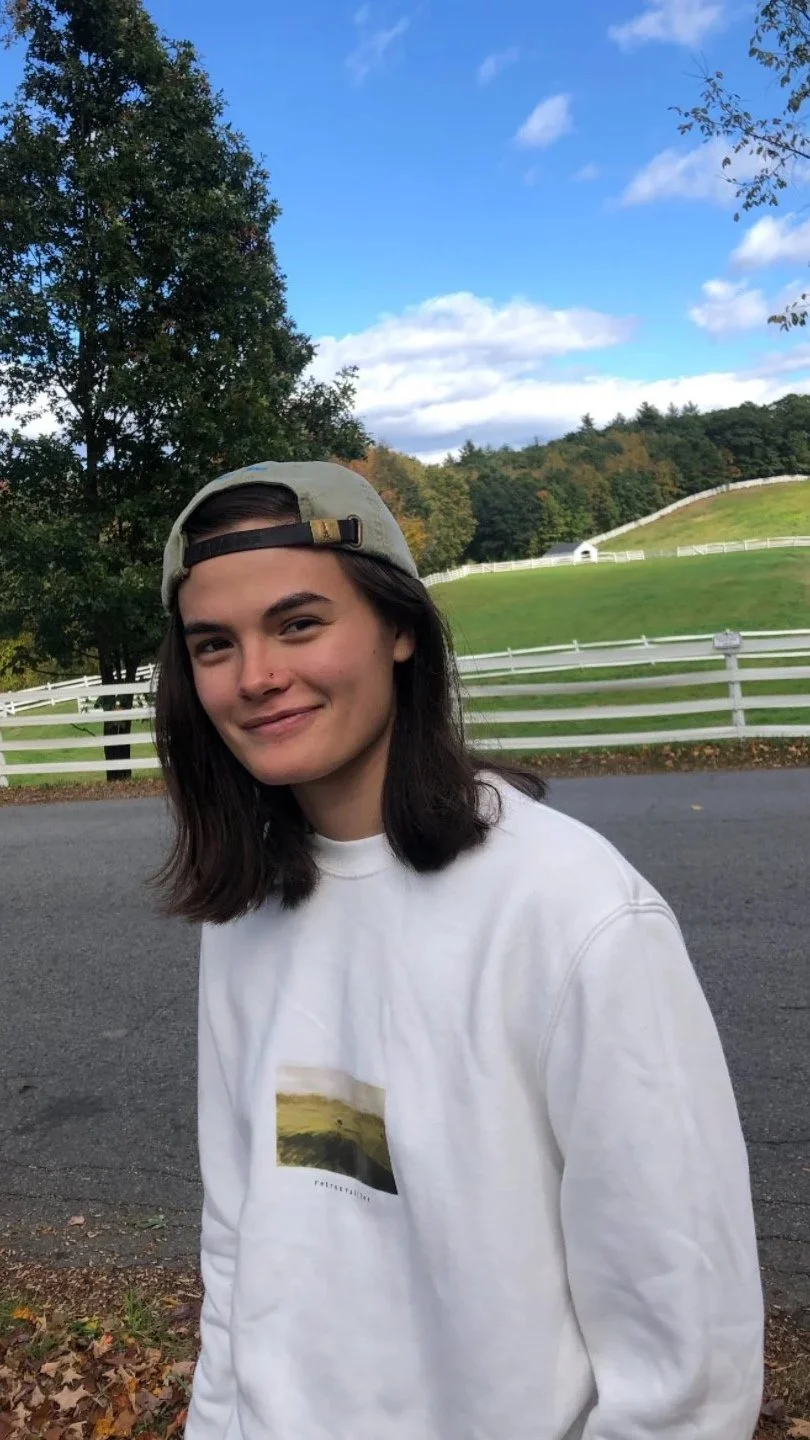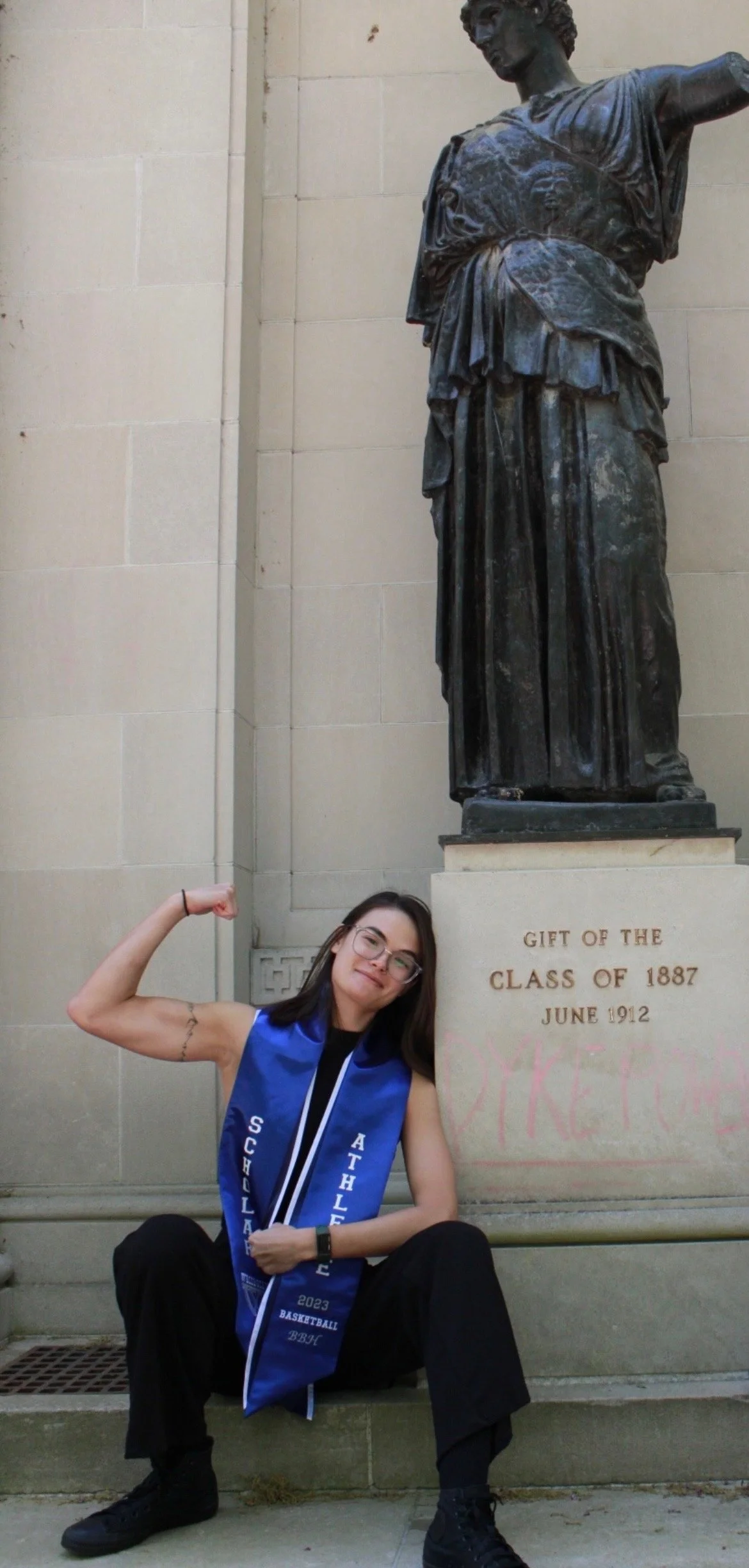Lily Erin: Finding Poetry in the Quiet
When people discover Lily Erin’s music… whether now or years from now… she hopes it meets them where they are. Not just as background noise, not just as melody, but as a mirror. A quiet affirmation.
“I want [people] to feel like the thoughts and emotions they have about the people in their lives, or themselves, are valid,” she says. “I want people to have that feeling that we are all living the same life in a way, that they are not alone”
Lily Erin wasn’t supposed to become a musician. For most of her life, music lived in the margins — between basketball practices, pandemic pauses, and the quiet ache of queerness she hadn’t yet named. Even when she started playing piano again in college, it wasn’t with a dream of releasing songs. It was just a way to feel something real.
But then came Bus Stop, a stripped-down, emotionally gutting debut single about grief, distance, and the ghosts we carry when someone disappears from our lives. It was the kind of song that doesn’t ask for attention, but earns it.
“I felt really proud, like I could actually do this.” Lily says now, reflecting on the invisible line she crossed between private creation and public release. “[I’d] been dancing around with writing music for years but never got serious about it or was too fearful to share the product with even my close friends, but when I wrote Bus Stop, I felt really proud.”
Since then, she’s been navigating the early stages of the indie artist hustle, learning in real time what it means to be vulnerable in public. “The sheer number of people who also believe in their work, and who have much higher budgets than I do…” she admits. “I need to stay focused on my own journey. To have 70 people who reliably stream my one song is progress. And when I release more, I will grow more. I just need to keep my eyes on my own paper.”
And even in a crowded field, Lily Erin stands out, not through spectacle, but through sincerity. Her lyrics land softly but cut deep. Her voice is unpolished but honest. And her point of view — queer, introspective, quietly fierce and it is exactly the kind of voice that deserves the spotlight.
Soundtracked by Outsiders
Lily’s relationship with music has always been shaped by tension, between what she was given, and what she had to find for herself.
Growing up in Los Angeles, she and her sisters weren’t allowed to listen to the radio… not out of strictness, but because their mom held a deep belief that “music isn’t what it used to be.” In their house, the radio dial stayed off, replaced by the CD rotation of a generation earlier: Bruce Springsteen, Fatboy Slim, and curated 80s and 90s hits.
The result was a kind of musical isolation. When her family moved from L.A. to Buckeystown, Maryland, and Lily entered a new middle school, she felt out of step with the pop culture touchpoints of her peers. That’s when she says “my sisters and I won the fight to begin listening to Top 40 in order to better relate.”
That shift led her straight to P!nk; brash, bold, and unapologetically different. “She didn’t fit the traditional mold of femininity,” Lily says. “the only prominent pop star of that era who spoke to me.”
But it was Lorde’s Pure Heroine that changed everything. “I began to view music as more than just entertainment or a mode for rebellion. Lorde made us realize that music is poetry” she says. But the real turning point came in high school, with Cleopatra by The Lumineers playing on repeat.
I’d hole up in a coffee shop, intending to study, and instead play Cleopatra on loop, staring reflectively at the wall.” she remembers, “It was this song that dragged me into neo-folk music, the idea that music can serve as a function to tell more than the story of the singer, that the narrator can be any human so long as there is a story to tell. I loved that.” she remembers “It felt like an opportunity to step outside myself and think about the many stories I’ve heard, the lives lived beyond my own and think critically about the human experience.”
Then came the moment that changed Lily’s lens as a queer artist: hearing Lucy Dacus for the first time. “[It was] the first time I heard the pronouns in music that resonated with me,” she says. It was Nightshift, Dacus’ devastating anthem of post-breakup grief and queer longing, that hit hardest. “How beautiful and painful [it was],” she says. “After that discovery, I began to actively search for queer representation in the music industry.”
From Lucy Dacus, Lily followed the threads to boygenius, to a world of queer storytelling, to newer voices like Renée Rapp. The Rise and Fall of a Midwest Princess hit her differently.
“For the first time, sapphic music had become dimensional,” she says. “that we are not just sad, hopeless romantics. We can be anything… For the first time, I felt there was room to move my arms and create whatever kind of music I wanted..”
The Lyrics That Stay
Though Lily considers herself a “lyrics-first” artist, her actual writing process is fluid and improvisational. She starts with chords on the guitar or piano, then hums melodies. Only once the rhythm is clear does she begin sketching in what she calls “filler words”… placeholder lyrics meant to guide the shape of the song.
But those placeholders often reveal something deeper. “Usually there are one to two lines from the filler words that really speak to me and I build the world from there” she says. “I do find that when I am moved by words that were intended to be thrown out — my filler words — those words were always meant to find me.”
That’s how Bus Stop came to life. And it’s how her next single, Ruler, was born; a track that laments the dull ache of routine and the quiet rage of knowing you’re capable of more. One lyric in particular stands out:
“I curse the cars for my worn out brakes,
pass the cross at the guardrail,
well, I knew it then.
So I’ll be quiet again.”
“There’s a lot of melodrama we feel about the mundanity,” she says. “frustration of everyday life, and this image of wanting to scream at the traffic until you’re reminded of greater pain is one that has always affected me.”
Coming Out Into Color
Lily’s queer identity isn’t just part of her music, it’s the reason she can make music at all.
Lily didn’t come into her queerness in an environment that welcomed it. “I was attending [Catholic] school in a very rural setting,” she says, “there were lovely people, but not much representation and, to be frank about it, not a ton of acceptance in my community.”
She was trying to figure things out, though she didn’t have the words for it yet. She remembers lying in bed at night, “I remember distinctly the feeling of falling asleep at night, begging myself not to let the question “am I a lesbian?” even enter the front of my mind and crying over “something abstract” I wouldn’t allow myself to label.”
Everything changed when she got recruited to Wellesley College, a historically women’s college outside Boston. “I was surrounded by smart, curious, artistic queer people and my entire style changed,” she says. “It was normal to be gay there, and it opened my eyes to how unfair the world was outside the microcosm.”
Though she’s now in a long-term relationship, Lily doesn’t write many love songs. “I don’t write much about love,” she says, “since it belongs to us and behind closed doors. She, however, is my biggest supporter and, if it weren’t for her, I would not have had the courage to release Bus Stop, so in that way, love is everything to my music”
She doesn’t write about being a lesbian in every song, but her queerness is in the soil. “My queerness informs my personality so heavily, though, so it will be central to conversation I have and, if given platform, I will certainly use it to uplift my queer community.”
Still, she knows how powerful visibility is. “I am a proud lesbian and I did not have that kind of representation growing up. Even now, it is difficult for me to find peers who use the specific label proudly, and I never want that to be the case for the next generation of the queer community.”
Building a Career by Hand
Lily’s first few steps into the music world have been fiercely DIY, and full of friction. “The process has been difficult!,” she admits. “I believe in the quality of my work but it can be overwhelming seeing the sheer number of people who also believe in their work, and who have much higher budgets than I do right at the start of my career.”
The biggest challenge? Standing out. “It feels like a critical time every day, trying to establish my brand but also take advantage of trends so I can begin to get eyes on my music,” she says.
But she’s learning how to stay grounded. “To have 70 people who reliably stream my one song [Bus Stop]is progress. And when I release more, I will grow more.”
Her dream tour isn’t a stadium. “My ideal first tour would be small, queer spaces with lots of standing room. I want my core crowd at my first tour, know all the words, feel all the emotions. That’s the kind of energy I would need to show me that my work means something.“
And what does she want people to say about her five years from now?
“There has been no greater compliment I’ve given an artist than to assign them the title “poet.” I hope they feel I am a poet.”




